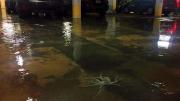Robert Verchick, J.D. ’89, professes environmental law at Loyola University and is a senior fellow in disaster resilience at Tulane—both in New Orleans, providing an up-close-and-personal view of the threats from climate change: rising seas, more powerful hurricanes, and more. In The Octopus in the Parking Garage: A Call for Climate Resilience (Columbia University Press, $32), he points out the quotidian evidence of inevitable risks and what to do about them. From the first chapter:
In the parking garage of the Mirador 1000 condominium complex—days after a bronze “supermoon” had swallowed Miami’s night sky—there were two signs that things had not yet returned to normal. One was the green pool of water that sloshed around the tires of about a dozen stranded cars. The other was the tentacles.
The source of the pool was a fountain of water bubbling loudly from a corroded floor drain.…A few feet away, protruding just above the water’s surface, was the splayed form of an octopus, its rubbery limbs heaving against the cool cement. On the morning of November 14, 2016, when Miami resident Richard Conlin happened upon this sight, he did what any of us would have done. He shot photos and video with his phone and posted them on Facebook. The “Octopus in the Parking Garage” went viral.…
How the octopus got there is a longer tale of quirky plumbing and climate breakdown. The Mirador 1000 sits near the ocean, along with the parking facility and its accompanying drainpipes. Those pipes, which feed runoff into the ocean, were built years ago and were originally suspended above Biscayne Bay. But sea levels are rising…and this, along with other human impacts on the bay, now leave many drainage pipes submerged and vulnerable to flooding at high tide.…
The kind of tidal flooding that forced our friend into reserved parking is forcing a lot of change in Southeast Florida. That’s because these “sunny day floods,” as the locals call them, have been increasing because of sea level rise. Today the region experiences 10 tidal floods per year. By 2045, scientists think Southeast Florida will see 240 floods per year. The floods snarl traffic, maroon pedestrians, kill lawns, destroy property. Even worse, as tidal pressure builds below the surface, saltwater is squeezed into the aquifers that provide drinking water to six million South Floridians.…
It’s a tale of two Atlantises. “Some people’s houses will be behind the seawalls and some people’s houses will be in front of the seawalls. If you are in your seventies and you’ve got millions of dollars in a hedge fund, go live on Star Island,” [Kathleen Sullivan] Sealey [a University of Miami biologist] advised, referring to an exclusive residential island in Biscayne Bay….“If you lose that home, you’ll be fine. But you’ve got three or four kids, and you’re trying to build equity in your home, and you’ve got credit card debt, you need to move.”









